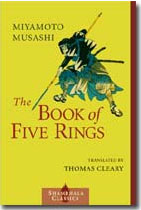The Book of Five Rings

Miyamoto Musashi (1634)
Reviewer: Michael G Dilcock
When I read with great interest our editor Caroline Bagshaw’s recent call for papers under the banner of ‘Arts in Business’ I was struck by the insightful significance of such a wide ranging and most meaningful area of enquiry/consideration.
My mind was immediately cast back some thirty plus years when my good friend Robert Allen gave me a copy of this book; The Book of Five Rings by Miyamoto Musashi. Robert and I were very keen students of karate in the style of Shukokai (meaning the way for all) and our enthusiasm not only centred on the physical training attributable to the discipline but also on appreciation of the historical culture and artistry that had contributed to its emergence in Japan and worldwide continuance to date.
Whilst I read the book with zeal at the time it would be a decade later that my career development and move towards more academic appreciation of this ‘phenomenon’ we call management would cause me to revisit this intriguing and most insightful of texts on the subtle arts of both confrontation and victory. The writing clearly analyses the process of struggle and mastery over conflict underlying every level of human interaction. I had several opportunities to introduce this book to postgraduate management students in the late 1990’s and was struck by the negative, and at times almost hostile, reaction not only to this book but also to numerous other esoterically based texts per se.
As Caroline intones in her call for papers it was as if …some regard it as a distraction from 'real business’… as one MBA student most seriously lamented; “I’m here to learn about business administration, not Kung Fu nor poetry and most certainly not philosophy!” Well perhaps as the late great comedian Eric Morecambe would say with glasses askew; there’s no answer to that! However one might reasonably argue that the curricular rigidity developed and applied in management learning over the last three decades may in some part be directly proportional to the current global malaise as the single bottom line imperative and ever increasing shareholder wealth maximisation has constrained management and severely diminished its capacity for wider more meaningful considerations.
It is almost 380 years on since Musashi put brush to paper and the content is both compelling and tantalisingly relevant as his teachings mirror in the simplest terms and phraseology that which the most eminent of current business gurus strive to portray. This book along with similar historically placed pieces amongst others i.e. Yagyu Munenori’s; The Book of Family Traditions on the Art of War were of great strategic significance in the rise and rise of business management excellence post the 2nd World War. It became a well-known classic for American business executives intent upon successful analysis and insight into the Japanese approach to business strategy. This is a tremendous resource for managers at all levels, academics, entrepreneurs and others who seek a deeper understanding of modern warfare perhaps better known as business and or politics.


